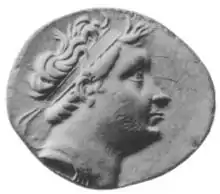Nicomedes II of Bithynia
Nicomedes II Epiphanes (Greek: Νικομήδης ὁ Ἐπιφανής "Nicomedes God-Manifest") was the king of Bithynia from 149 to c. 127 BC. He was fourth in descent from Nicomedes I. Nicomedes II was the son and successor of Prusias II and Apame IV. His parents were related as they were maternal cousins.
| Nicomedes II | |
|---|---|
 | |
| King of Bithynia | |
| Reign | 149 – 127 BC |
| Predecessor | Prusias II |
| Successor | Nicomedes III |
| Born | Bithynia |
| Died | 127 BC Nicomedia |
| Issue | Nicomedes III Nysa |
| Greek | Νικομήδης Β΄ |
| Father | Prusias II |
| Mother | Apame IV |
| Religion | Greek Polytheism |
Life
He was so popular with the people that his father sent him to Rome to limit his influence. However, in Rome, he also gained favor from the Roman Senate, forcing Prusias to send an emissary named Menas with secret orders to assassinate him.[1] But the emissary revealed the plot, and persuaded the prince to rebel against his father.[2]
Supported by Attalus II Philadelphus, king of Pergamon, he was completely successful, and ordered his father to be put to death at Nicomedia.[3] During his long reign Nicomedes adhered steadily to the Roman alliance, and assisted them against the pretender to the throne of Pergamon Eumenes III. He was succeeded by his son Nicomedes III.
Nicomedes introduced the Bithynian era for numbering years on his coins. This system was to last in parts of the Greek world down to the 4th century AD.[4]
References
- Appian. The Mithridatic Wars.
He sent Menas as his fellow ambassador, and told him if he should secure a remission of the payments to spare Nicomedes, but if not, to kill him at Rome.
- Appian. The Mithridatic Wars.
- Appian. The Mithridatic Wars.
Prusias fled to the temple of Zeus, where he was stabbed by some of the emissaries of Nicomedes.
- Jakob Munk Højte, "From Kingdom to Province: Reshaping Pontos after the Fall of Mithridates VI", in Tønnes Bekker-Nielsen (ed.), Rome and the Black Sea Region: Domination, Romanisation, Resistance (Aarhus University Press, 2006), 15–30.
 This article incorporates text from a publication now in the public domain: Chisholm, Hugh, ed. (1911). "Nicomedes II.". Encyclopædia Britannica. 19 (11th ed.). Cambridge University Press. p. 664.
This article incorporates text from a publication now in the public domain: Chisholm, Hugh, ed. (1911). "Nicomedes II.". Encyclopædia Britannica. 19 (11th ed.). Cambridge University Press. p. 664.
| Preceded by Prusias II |
King of Bithynia 149 BC – 127 BC |
Succeeded by Nicomedes III |